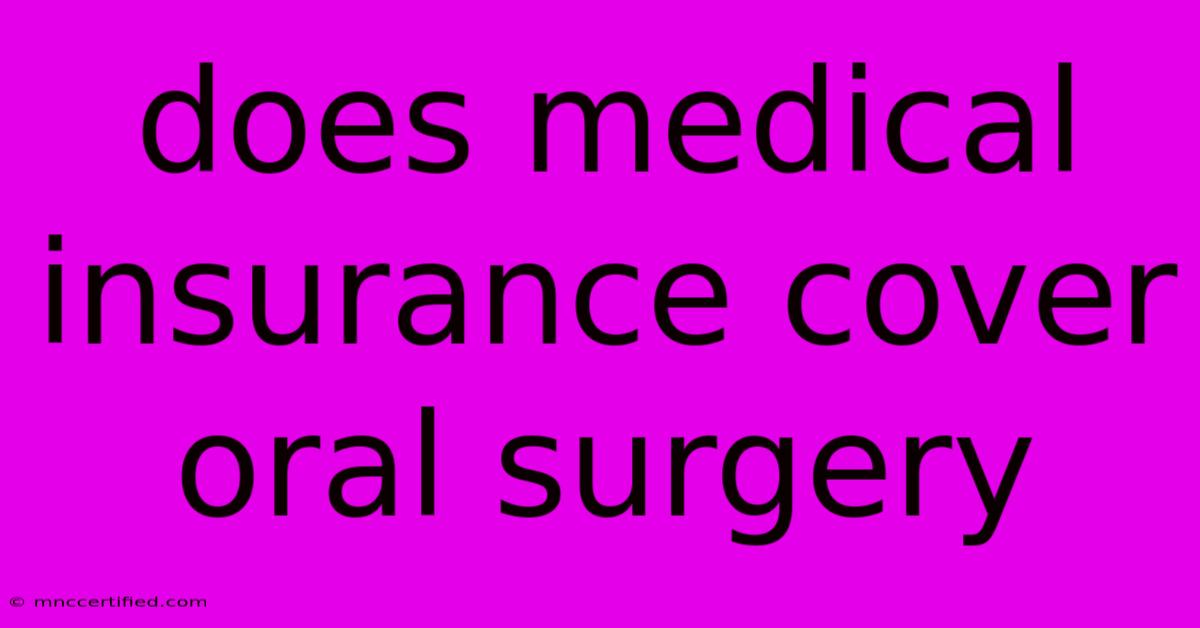Does Medical Insurance Cover Oral Surgery

Table of Contents
Does Medical Insurance Cover Oral Surgery? A Comprehensive Guide
Dental care is an essential part of overall health, and oral surgery is a common procedure that can address a variety of dental issues. But when it comes to coverage, many people wonder: does medical insurance cover oral surgery? The answer is complex and often depends on several factors, including the type of insurance, the specific procedure, and the underlying medical condition.
Understanding the Coverage Landscape
Typically, dental insurance is designed to cover routine dental care like cleanings, fillings, and extractions. However, medical insurance may cover oral surgery if it's considered medically necessary. This means the surgery must be performed to address a medical condition that could potentially impact your overall health.
Here's a breakdown of the key considerations:
1. Medical Necessity:
- Underlying medical conditions: Oral surgery related to conditions like cancer, infections, or trauma is more likely to be covered by medical insurance as it directly impacts your overall well-being.
- Impacted wisdom teeth: While routine wisdom teeth removal may be covered by dental insurance, if there are complications like infection or cysts, medical insurance may step in.
- Jaw reconstruction: Reconstructive surgery after an accident or for conditions like TMJ disorder could be covered by medical insurance due to its impact on facial structure and function.
2. Insurance Plan Coverage:
- PPO vs. HMO: Preferred Provider Organizations (PPOs) often offer more flexibility and coverage than Health Maintenance Organizations (HMOs), especially when it comes to out-of-network providers.
- Specific plan benefits: Each insurance plan has its own set of benefits, so carefully review your plan documents or contact your insurance provider to understand what procedures are covered.
- Pre-authorization: Many medical insurance plans require pre-authorization for oral surgery procedures, so it's crucial to obtain this approval before the surgery.
3. The Procedure Itself:
- Cosmetic procedures: Procedures primarily for aesthetic purposes, such as dental implants for purely cosmetic reasons, are generally not covered by medical insurance.
- Bone grafting: While bone grafting is often used in dental procedures, it may be covered by medical insurance if it's medically necessary to support a compromised jawbone structure.
- Extractions: Routine tooth extractions are usually covered by dental insurance, but if the extraction is due to a medical condition, it might be covered by medical insurance.
Tips for Maximizing Coverage
- Consult your insurance provider: Before scheduling any oral surgery, contact your medical insurance provider to discuss coverage details.
- Seek a medical referral: If your oral surgery is medically necessary, ask your primary care physician for a referral to a qualified oral surgeon.
- Obtain pre-authorization: Don't skip the pre-authorization process, as it helps avoid unexpected costs.
- Explore dental insurance options: If you don't have dental insurance, consider exploring plans that might cover some aspects of oral surgery.
- Document medical necessity: Keep detailed records of any medical documentation related to the need for oral surgery.
Navigating the System
The world of insurance coverage can be complex, but understanding your options and following these steps can help you navigate the process smoothly. Remember, it's always best to be proactive and informed about your coverage before making any decisions regarding oral surgery.

Thank you for visiting our website wich cover about Does Medical Insurance Cover Oral Surgery. We hope the information provided has been useful to you. Feel free to contact us if you have any questions or need further assistance. See you next time and dont miss to bookmark.
Featured Posts
-
Bitcoin Price A Real Time Indicator During Market Volatility
Nov 07, 2024
-
Brugge 1 0 Aston Villa Mings Concedes Penalty
Nov 07, 2024
-
Microstrategy Stock Price Prediction 2030
Nov 07, 2024
-
Ranked Choice Voting Lurie Ahead In Sf Mayor Race
Nov 07, 2024
-
Celebrities Towered Over By Their Kids
Nov 07, 2024